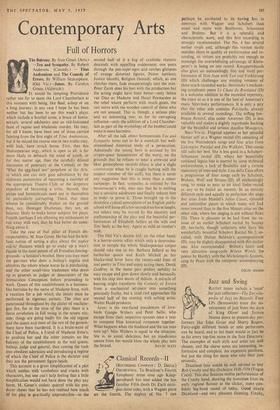-1 " Classical Records—II (RECORDING COMPANY : D, Decca.) ORCHESTRAL. To
Bruckner's Fourth Symphony some time ago Knap- pertsbusch has now added the less familiar Fifth (both D). Each occu- -pies three sides, with a Wagner piece on the fourth. The neglect of No. 5 can
perhaps be attributed to its having less in common with Wagner and Schubert than usual and more with Beethoven, Schumann and Brahms. But it is a splendid and characteristic work, and this first recording is strongly recommended. The No. 4 has several earlier rivals and, although' this version easily matches them in quality of performance and re- cording, its virtues are probably not enough to outweigh the overwhelming advantage of Klem- perer's in being on one record. Knappertsbusch also gives an outstandingly fine and vivid per- formance of Don Juan with Tod mind Verkliirung (D) which challenges any existing versions of these much-recorded works. Stravinsky's enchant- ing symphonic poem Le Chant du Rossigno! (D) is a welcome addition to the recorded repertory, the more so as it is one of the best of Ansermet's many Stravinsky performances. It is only a pity that the other side contains Pulcinella, already available in several recordings. The trifling bur- lesque Renard, also under Ansermet (D), is less valuable and makes a slightly regrettable backing for the beautiful and serious Apollo?! Musagetes.
SOLO Vocal_ Flagstad appears as her splendid former self in a Wagner recital (D) consisting of the five Wesendonck songs and four arias from Lohengrin, Parsifal and Die Walk lire. This music still suits' her best. She is less good in a Schubert- Schumann recital (D), where her beautifully sustained legato line is marred by some technical awkwardness, a lack of flexibility and a certain monotony of tone and style. Lisa della Casa offers a programme of four songs each by Schubert, Brahms, Wolf and Strauss (D), all enchantingly sung, to make as near to an ideal lieder-recital as any to be fotind on records. In an entirely different style and equally to perfection she sings five arias from Handel's Julius Caesar, splendid and unfamiliar pieces in which many will find more reward than in the five Mozart arias on the other side, where her singing is not without flaws (D). There is pleasure to be had from the re- issue of an earlier Schubert recital by Souzay (D, ten-inch), though collectors who have his wonderfully beautiful Schubert Recital No 2, so- called, with Dalton Baldwin's accompaniment (D), may be slightly disappointed with this earlier one. Also recommended : Britten's latest and very attractive song-cycle Winter Words (to poems by Hardy), with the Michelangelo Sonnets, sung by Pears with the composer accompanying (D).
COLIN MASON










































 Previous page
Previous page